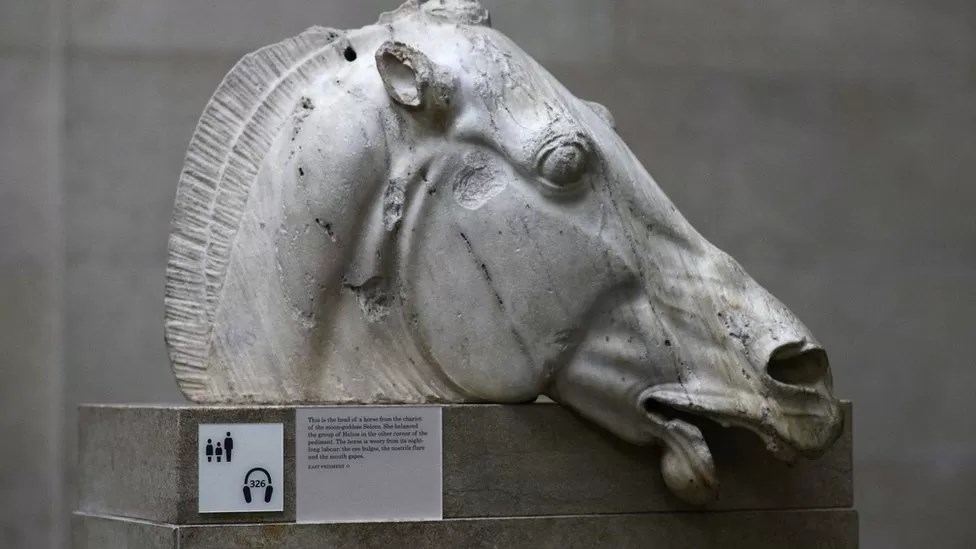UK gov, British Museum at loggerheads over Parthenon Marbles: Docs
The British government lately declassified records uncovering that the Foreign Office was pretentious about the British Museum’s endeavors to hold the Parthenon Marbles in 1983.
-

One of the classical Greek sculptures (Reuters)
The Parthenon Marbles have long been at the core of the restitution debacle. While talk of their potential return from the British Museum to Greece resumed, the long narrative surrounding the artifacts is just going deeper.
The British government lately declassified records uncovering that the Foreign Office was pretentious of the British Museum’s endeavors to hold the Parthenon Marbles in 1983, as per The Art Newspaper.
The question of where the marbles should be located stepped to the fore when Greek culture minister Melina Mercouri visited London that year. Her “colorful personality and romantic cause attracted considerable interest and media coverage,” government records state.
Worry over losing the argument seems dominant in the documents, which reportedly note that Mercouri “undoubtedly stole the limelight from her protagonist, David Wilson [director] of the British Museum," most notably during a televised debate at London’s Institute of Contemporary Arts.
Mercouri contended that the marbles “are an integral part of a monument that represents the national spirit of Greece,” which Wilson refuted claiming that they are part of an international institution that “should not be dismembered.” Officials at the Foreign Office decided that Mercouri “won the argument hands down” in a victory against their own representative.
Peregrine Rhodes, the British Ambassador in Athens, stressed that “arguments put by Wilson are likely to be counterproductive” among the Greeks. Ahead of Mercouri’s visit, he maintained that the United Kingdom should grasp the idea. “To fudge the issue can only store up trouble for the future,” he said.
John Macrae, the Foreign Office’s head of cultural relations, acknowledged in the report more than four decades ago that “the problem seemed to me to be one that would be with us for some time to come. We had to live with it and as far as possible contain it.”
The report also revealed that Brian Cook, the British Museum’s curator of classical antiquities, was just as ineffectual at debating Mercouri as Wilson had been. In another meeting during her visit, Cook made “a disappointing and pedantic defense, aimed at proving that Elgin was not guilty of vandalism and that the Parthenon was a symbol of Athenian imperialism, not Greek freedom and nationhood."
To that point, Macrae wrote that “it is a pity that the BM [British Museum] does not make a more effective defence of their claim to the Marbles,” adding that “the BM should remember that what Parliament giveth, Parliament taketh away.”
Trustees are not permitted to deaccession from the collection due to the 1963 British Gallery Act, which is still being utilized to dismiss Greek compensation claims nowadays.
Former Labour arts minister Hugh Jenkins proposed modifying this act to permit deaccessioning in May 1983, ahead of Mercouri’s visit; however, this was opposed by the conservative government at the time and was not passed. According to him, the marbles’ return would “start a process of piecemeal break-up of the British Museum collections."
The Parthenon Marbles, a collection of 5th-century BCE architectural masterpieces, are at the center of one of the highest-profile restitution cases in history, which were removed from the Parthenon temple. It was located on the Acropolis in Athens in the early 19th century until it was taken by British diplomat Lord Elgin when the country was under Ottoman rule.
The restitution decision was taken last year during former PM Boris Johnson's term but was handed over to Truss after her succession. With the possibility of halting that decision, Greek PM Kyriakos Mitsotakis may talk Truss into reconsidering during an intergovernmental meeting set for later this year.
A campaign of returning looted artifacts has hit museums across Europe and the UK as the British Museum has recently faced controversy for holding the Benin Bronzes (looted from Benin City, in modern-day Nigeria) to the Rosetta Stone (originally from Egypt) and Hoa Hakananai’a (a stone sculpture taken from Easter Island). The Horniman Museum in London announced back in August its intentions to return 72 treasured artifacts, including its collection of Benin bronzes, to Nigeria in what experts described as an “immensely significant” moment.
Read next: Truss rejects repatriating Parthenon marbles to Greece

 4 Min Read
4 Min Read








